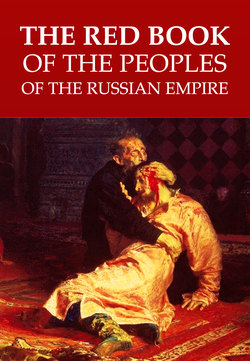The Red Book of the Peoples of the Russian Empire

Реклама. ООО «ЛитРес», ИНН: 7719571260.
Оглавление
Margus Kolga. The Red Book of the Peoples of the Russian Empire
To the Publisher
The Abazians
The Abkhaz
The Aguls
The Akhvakhs
The Aleuts
The Altaics
The Aliutors
The Andis
The Archis
The Asiatic (Siberian) Eskiomos
The Bagulals
Barbara Tatars
The Bartangs
The Bats
The Bezhtas
The Botlikhs
The Budukhs
The Central Asian Jews
The Chamalals
The Chukchis
The Chulym Tatars
The Crimean Jews
The Crimean Tatars
The Didos
The Dolgans
The Enets
The Evens
The Evenks
The Georgian Jews
The Godoberis
The Hinukhs
The Hunzibs
The Ingrians or The Ingrian Finns
The Ishkashmis
The Itelmens
The Izhorians or Ingrians
The Kamas
The Karamais
The Karatas
The Karelians
The Kereks
The Kets
The Khakass
The Khants
The Khinalugs
The Khufis
The Khvarshis
The Kola Lapps
The Koryaks
The Kryz
Kurds
The Lithuanian Tatars
The Livonians
The Mansis
The Mountain Jews
The Nanais
The Negidals
The Nenets
The Nganasans
The Nivkhs
The Nogays
The Orochis
The Oroks
The Oroshoris
The Peoples of the Pamirs
The Roshanis
The Rutuls
The Selkups
The Shors
The Shughins
The Tabasarans
The Talysh (or the Talishi)
The Tats
The Tindis
The Tofalars
The Trukhmens or Turkmens
The Tsakhurs
The Udeghes
The Udis
The Ulchis
The Veps
The Votes
The Wakhs
The Yaghnabis
The Yazgulamis
The Ykaghirs
Отрывок из книги
Margus Kolga, Igor Tõnurist, Lembit Vaba, Jüri Viikberg
THE RED BOOK OF THE PEOPLES OF THE RUSSIAN EMPIRE
.....
Surpassing both alphabetic somersaults and ideological hammering, it was the destruction of local economies that had the most destructive effect on Soviet minority peoples. Wasteful exploitation has ruined the frail tundra environment of the North as well as the orchards of the South, it has forced hundreds of thousands of people to engage in work that suits neither their abilities nor habits, nor even their understanding of the world. It has forced some nomadic tribes to settle, and, vice versa, it has led hordes of migrants to previously rationally tended tundra, forests and valleys. In Central Asia people suffocate on cotton, the northerners are plagued by the mineral resources discovered on their lands (cf diamond prospecting in Kimberley or rubber plantations on the Amazon). Public concern has been aroused by the condition of the rain forests but it is high time to begin paying some attention to the tundra of northern Eurasia, too. The preservation of minor nations is not a mere caprice of nostalgically-minded scholars, it is a vital issue. What is meant is not a formal preservation, where a nation is termed ‘alive’ when there are about 20,000 speakers of the language left. Rather, a nation is alive when the national economy, social organization and culture constitute a whole. This in its turn means that all the manifestations and forms of national life are in compliance or, at least, in the process of adaptation with the imperatives inherent in that particular culture. Viewed in those terms almost all the peoples in this book have ceased to be nations and have instead become just groups of people sharing some ethnic peculiarities — be they linguistic, anthropological or customary. The Chukchi are no longer Chukchi if some force other than nature should cut them off from whale and walrus hunting. Divorced from their natural mode of life, their traditional dress, (fairy) tales and (traditional) wisdom lose much of their meaning.
To a certain extent a mutilated culture can be cured. Limited damage sustained over a short period may be healed by the culture itself if the conditions are favourable. There are possibly several nations that would find their feet again if they were immediately allowed to resume their as yet unforgotten tradition al lifestyle. In a number of cases, however, this would require the departure of migrants from their lands, the shut-down of derricks and an end to pollution. Obviously this is not going to happen in a day and much special attention would be required. However, it is conceivable that even oil-wells could be operated without causing too much pollution and without creating impassable obstacles to the path of reindeer.
.....